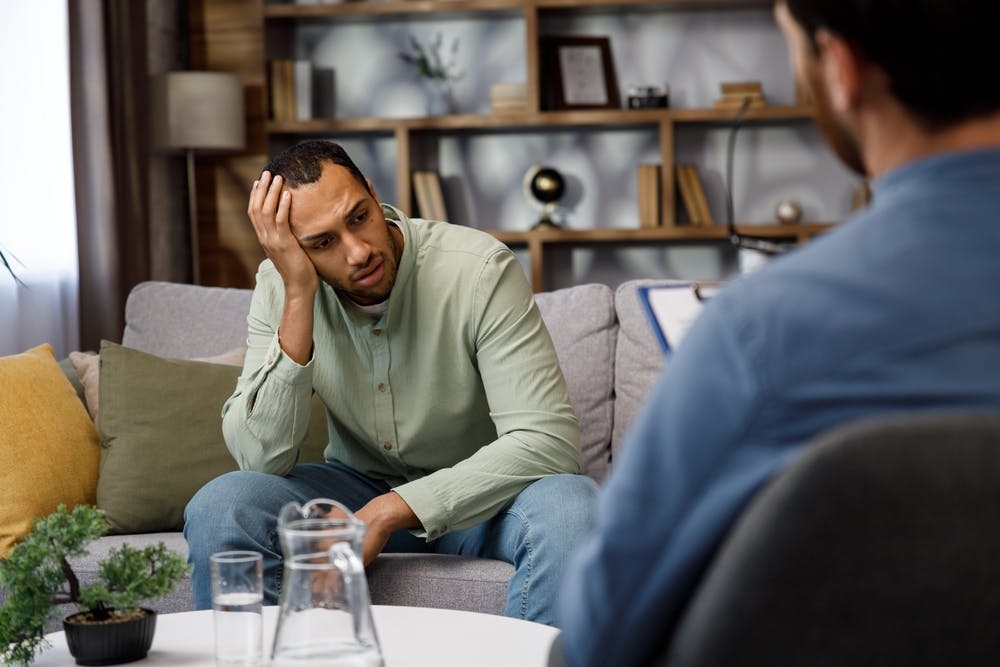When people experience physical symptoms of anxiety, such as dizziness, tiredness, excessive sweating, and shortness of breath,[1] they turn to the internet for answers to ‘What does anxiety mean?’ and ‘What does anxiety feel like?’ For questions like these, it is best to consult a doctor.
Mosh makes it easy to connect with an AHPRA-registered doctor. You can get in touch with them via text, call, or video conferencing, so you can talk about the feelings of anxiety you experience privately from your home. You can improve your chances of getting the right help as you may feel more comfortable talking to your doctor online than in a traditional clinic, where you worry about other patients overhearing you.
In reference to the Diagnostic and Statistical Manual of Mental Disorders, a state of anxiety is characterised by apprehension, tension, or uneasiness that results from anticipating internal or external harm or danger. In some ways, anxiety can be viewed as the psychological equivalent of physical pain.[2]
It is hard to get to the bottom of what does anxiety mean exactly from a single point of view; there are many factors to consider when it comes to anxiety and mental health. You may get some helpful insights below as we answer ‘what causes anxiety?’ and other related questions.
Feeling nervous is a normal and common reaction to certain situations, such as taking a test or going for a job interview. However, some individuals suffer from excessive worry and find it difficult to control their emotions.
Someone who is distressed for a long time without apparent reason may be experiencing Generalised Anxiety Disorder (GAD) rather than simple nervousness. A person with GAD may irrationally worry about potential threats to themselves or their loved ones, their health, finances, family matters, and their performance at work or school, even when there is no clear cause for alarm.[3]
But just because you or someone you know is experiencing these symptoms does not mean they automatically have an anxiety disorder. Only a doctor can diagnose a person with an anxiety disorder after conducting several assessments and considering a multitude of factors. Consult a doctor if you think you are experiencing anxiety.
You can learn a lot from a Mosh doctor besides ‘What does anxiety mean?’ They can also advise you on how to deal with anxiety and what helps with anxiety. You will be assessed by your Mosh doctor based on factors such as the anxiety symptoms you experience, your level of functioning, and any underlying medical conditions. In addition, they may examine the impact of anxiety on your daily life.
To get help from a Mosh doctor, you simply need to fill out the health quiz on the Mosh platform – it is free and only takes a few minutes to complete. Based on the information you provide, a Mosh doctor will give you tailored advice or schedule a virtual meeting with you to discuss your unique situation further.
An essential part of knowing what does anxiety mean is what causes it. The cause of your anxiety is also an important consideration if you want to know how to calm anxiety. Trauma, childhood experiences, and panic disorders are all potential causes of anxiety. Some medications and substance abuse may also induce anxiety.[4]
But because each person’s situation is unique, seeking guidance from a doctor is the ideal course of action. Various factors may contribute to anxiety, so a doctor can help you gradually uncover the conditions or experiences you have had that may have led to your feelings of anxiety.
If your Mosh doctor recommends a Mosh mental health treatment plan and you accept it – you are free to move forward with Mosh as you like – you get ongoing consultations with your doctor. Through continuous consultations, your Mosh doctor can better grasp your condition and provide tailored guidance to increase your chances of achieving your mental health goals.
You can keep in touch with your Mosh doctor via text, call, or video chat so they can monitor your progress and make adjustments to your treatment plan if necessary. When appropriate, you may also explore other treatment options, such as medication or therapy, with your Mosh doctor so they can help you make an informed decision on which method can give you a better chance of success.
When someone suffers from an anxiety attack, they experience intense anxiety that may lead to physical symptoms of fear like a pounding or racing heart, sweating, trembling, and chest pain.[5] The onset of an anxiety attack is typically sudden and often does not correlate with an external threat. It may last from a few minutes to half an hour, but the mental and physical effects may persist for hours afterwards.[6]
Frequently occurring and prolonged panic attacks can be severely disabling; they may cause a person to avoid various situations altogether. A person may eventually fear leaving their home or being alone if no intervention is sought to alleviate the symptoms of an anxiety attack.[7]
Since you already know what does anxiety mean and what are the symptoms of anxiety, it is likely that you understand when to seek the mental health support you need. We know it is not easy to open up about your mental health concerns, but know that you are not alone; help is available, and we at Mosh want to make it easier for you to get the right help.
When you are ready to speak with a doctor about what does anxiety mean or other mental health concerns you have, use Mosh to connect with a doctor you can truly trust and be comfortable with.

